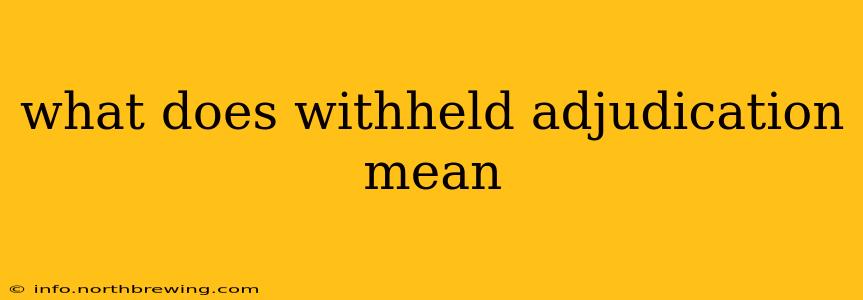Withheld adjudication, often referred to as deferred adjudication, is a legal term describing a type of probationary sentence. Instead of a formal conviction being entered on your record, the charges are essentially "held" while you successfully complete a period of probation. If you successfully complete all requirements of probation, the charges are dismissed, and you avoid a criminal record. However, if you violate the terms of your probation, the court can proceed with the original charges, resulting in a conviction and potential sentencing.
This system offers a second chance to individuals who have committed minor offenses, allowing them to avoid the long-term consequences of a criminal record. It's a crucial part of many justice systems aimed at rehabilitation and reducing recidivism. However, it's important to understand the serious implications of failing to meet the conditions of withheld adjudication.
What are the conditions of withheld adjudication?
The specific conditions of withheld adjudication vary greatly depending on the jurisdiction, the nature of the offense, and the judge's discretion. However, common conditions typically include:
- Regular check-ins: Meeting with a probation officer at scheduled intervals.
- Drug or alcohol testing: Submitting to random or regular drug and alcohol screenings.
- Community service: Performing a set number of hours of unpaid work for the community.
- Restitution: Repaying any financial losses incurred by the victim(s).
- Counseling or therapy: Attending sessions with a therapist or counselor to address underlying issues contributing to the offense.
- Maintaining employment: Keeping a stable job.
- Abstinence from alcohol and/or drugs: Remaining completely sober.
- No contact with specific individuals: Avoiding contact with victims or other involved parties.
- Curfew: Staying at home during certain hours.
How does withheld adjudication differ from probation?
While both withheld adjudication and probation involve completing certain requirements, a key difference lies in the final disposition of the case. With probation, a conviction is entered on your record immediately, and the probation period is essentially a sentence served in the community. Successful completion of probation doesn't erase the conviction, though it may lead to expungement or sealing of the record at a later date, depending on the jurisdiction and specific laws. With withheld adjudication, the conviction is avoided entirely if the probationary period is successfully completed.
What happens if I violate the conditions of withheld adjudication?
Violating the conditions of withheld adjudication has serious consequences. The court can revoke the withheld adjudication, enter a conviction on your record, and impose the original sentence, which could include jail time, fines, and other penalties. The severity of the consequences will depend on the nature of the violation and the judge's discretion.
How long does withheld adjudication last?
The length of withheld adjudication varies greatly depending on the specific circumstances of the case and the judge's discretion. It can range from a few months to several years.
Can I get a withheld adjudication for a felony?
The possibility of receiving withheld adjudication for a felony charge depends heavily on the jurisdiction and the severity of the crime. Felony charges are generally more serious, and withheld adjudication is less frequently granted for them compared to misdemeanor charges. The judge's decision will be based on several factors, including the defendant's criminal history, the nature of the offense, and their demonstrated willingness to take responsibility for their actions and make amends.
What are the long-term effects of withheld adjudication?
Successfully completing withheld adjudication can have significant long-term benefits. It avoids the stigma of a criminal record, allowing individuals to pursue employment, education, and housing opportunities without the barrier of a conviction. However, it is crucial to understand that it's not a guaranteed path to a clean record. Even after successful completion, some background checks might still reveal the initial charges, though a positive outcome often significantly minimizes the negative impact.
This information is for educational purposes only and should not be considered legal advice. If you are facing criminal charges, it's crucial to seek the advice of a qualified legal professional in your jurisdiction.
